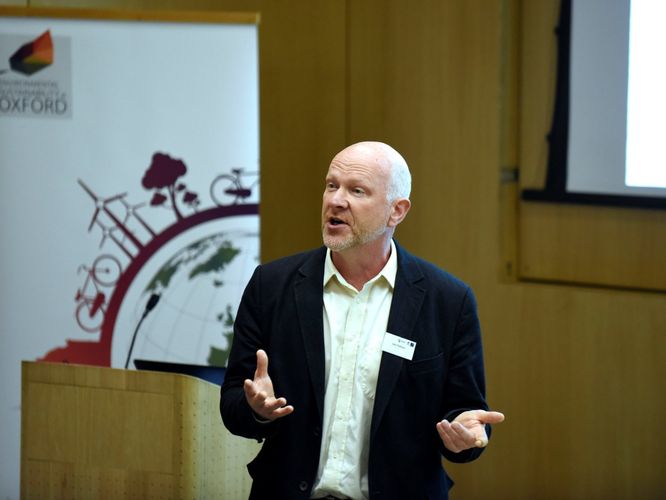Organised by the University of Oxford and the University of Warwick, the EAUC...
Organised by the University of Oxford and the University of Warwick, the EAUC chaired an event exploring approaches to capital project delivery last week. Proving popular, the event saw almost 100 attendees from across the post-16 education sector and the construction industry.
EAUC CEO Iain Patton facilitated the debate which looked at opportunities and challenges in improving operational energy performance in the construction process.
Universities and colleges are in a unique position to influence this as they themselves are owners and operators of large, complex and often expanding estates. The event sought solutions to the endemic performance gap in construction. By planning for sustainable longevity at the construction phase, it is hoped projects can avoid a legacy of avoidable costs in energy performance from the start.
Topics discussed were:
Iain Patton, Chief Executive of the Environmental Association for Universities and Colleges (EAUC), said: “This was a really productive event that saw professionals from across the construction and higher education industries discuss their experiences with the construction performance gap.
“It was established that there were common challenges across project development, procurement and delivery and we heard some suggested solutions to the challenges.
“This is an area that very much needs to be tackled to ensure we are not leaving a legacy of inefficient buildings for the future generations. This is an area that the EAUC has been looking at for some time. I look forward to further discussion of best practice on this topic in future events.”
Joel Cardinal, Head of Energy and Sustainability at University of Warwick, said: “It is very powerful to demonstrate universities, and more importantly the supply chain, want to collaborate to improve buildings and deliver successful projects in a win-win relationship. Together we can make a difference to influence construction practices. I look forward to the workgroups and the next seminar in which we aim to create an official recommendation.”
ENDS
Notes to Editor
1) Podcasts of the presentations will be available on the EAUC’s Sustainability Exchange shortly.
The previous event on this topic was hosted by University College London and AHR Architects on 13 April, 2016. The workshop presentation can be found here.
EAUC CEO Iain Patton facilitated the debate which looked at opportunities and challenges in improving operational energy performance in the construction process.
Universities and colleges are in a unique position to influence this as they themselves are owners and operators of large, complex and often expanding estates. The event sought solutions to the endemic performance gap in construction. By planning for sustainable longevity at the construction phase, it is hoped projects can avoid a legacy of avoidable costs in energy performance from the start.
Topics discussed were:
- The need to understand essential metrics, skills, procedures and contractual arrangements to support delivery
- How sharing evidence-based best practice from higher education and related sectors can help
- The risks, gaps and opportunities for client/supply chain partnerships to deliver value and quality
Iain Patton, Chief Executive of the Environmental Association for Universities and Colleges (EAUC), said: “This was a really productive event that saw professionals from across the construction and higher education industries discuss their experiences with the construction performance gap.
“It was established that there were common challenges across project development, procurement and delivery and we heard some suggested solutions to the challenges.
“This is an area that very much needs to be tackled to ensure we are not leaving a legacy of inefficient buildings for the future generations. This is an area that the EAUC has been looking at for some time. I look forward to further discussion of best practice on this topic in future events.”
Joel Cardinal, Head of Energy and Sustainability at University of Warwick, said: “It is very powerful to demonstrate universities, and more importantly the supply chain, want to collaborate to improve buildings and deliver successful projects in a win-win relationship. Together we can make a difference to influence construction practices. I look forward to the workgroups and the next seminar in which we aim to create an official recommendation.”
ENDS
Notes to Editor
1) Podcasts of the presentations will be available on the EAUC’s Sustainability Exchange shortly.
The previous event on this topic was hosted by University College London and AHR Architects on 13 April, 2016. The workshop presentation can be found here.











